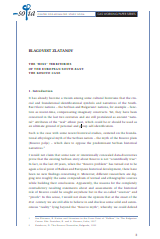HISTORY AND CHARACTER Visions of National Peculiarity in the Romanian Political Discourse of the 19th century
HISTORY AND CHARACTER Visions of National Peculiarity in the Romanian Political Discourse of the 19th century
Author(s): Balázs Trencsényi
Subject(s): Cultural Anthropology / Ethnology, Period(s) of Nation Building, Inter-Ethnic Relations
Published by: Centre for Advanced Study Sofia (CAS)
Keywords: Romanian discourse of national peculiarity; Transylvanian Greek Catholic elite; genealogical construction
Summary/Abstract: As in most European cases, some aspects of the Romanian discourse of national peculiarity can be traced back to the humanist genre of "Descripţia" of the land, narrating the origins and political history of the respective people, a genre which in the Danubian Principalities reached its climax in the works of the erudite Moldavian prince-scholar Dimitrie Cantemir (1673–1723).1 The works rooted in the humanist chorographical paradigm of course had a very different discursive function and referential basis than the characterological constructions underpinning the projects of modern nationhood and statebuilding, emerging from the late 18th century onwards, making "national individuality" a key argument of political self-legitimization. Some references to this national individuality can be identified in the political and cultural works of the Transylvanian Greek Catholic elite, which sought to anchor the historical-institutional identity of Transylvanian Romanians in a genealogical construction. They were stressing customs and behavior as the proof of continuity with the Roman colonists of Dacia and accidentally, even the concept of "character" surfaced in some of their writings. Simultaneously, the culturalgeographical literature stemming from the Danubian Principalities (often by travelers or cosmopolitan intellectuals, whose work can be related to more than one national tradition, such as the Greek Daniil Philippide or Dionisie Fotino, both of whom authored geographical descriptions of these lands, or the French Encyclopédiste, J. L. Carra) sought to put these polities on the map of Europe, making references to the customs of the inhabitants. Significantly, the concept of character was already able to become politicized in the late 18th century, as was the case with the reformist discourse of the Moldavian boyar Ionică Tăutul, who deplored the loss of patriotic identification and the growth of egoism on the part of the ruling elite.
Series: CAS Sofia Working Papers
- Page Count: 36
- Publication Year: 2011
- Language: English
- Content File-PDF
- Introduction

